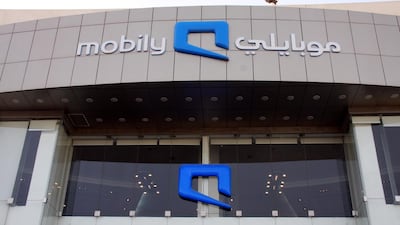Etisalat’s Saudi subsidiary stands to benefit from an overhaul of the kingdom’s telecoms licensing regime, with the prospect of lower annual licence costs bringing comfort to the country’s troubled operators.
The Communications and Information Technology Commission (CITC) has extended the operating licence of fellow telco Zain KSA for a further 15 years, according to an announcement yesterday by the country’s Capital Market Authority.
Under the new licensing arrangement, Zain KSA will pay 5 per cent of its annual net income to the government for the duration of the “unified” licence. A unified licence enables operators to offer landline telephone and internet services as well as mobile services, breaking the fixed-line monopoly of Saudi Telecom.
The CITC has offered similar extensions to the other three operators – Etihad Etisalat, known as Mobily, Saudi Telecom and Etihad Atheeb Telecommunications – the statement said.
In the statement there was no mention of an upfront fee for the licence renewal.
The CITC is understood to have had extensive discussions with all four operators regarding the new licensing regime, according to a person with knowledge of the matter who asked to remain anonymous.
The CMA suspended trading of shares in the four telcos, requiring them to state how the regime will affect their profits and losses.
The new licensing arrangement is likely to affect Zain KSA’s earnings positively in the future, with Mobily and other operators also likely to see benefit.
According to Nayal Khan, the head of institutional equities sales trading at Saudi Fransi Capital in Riyadh, Zain KSA paid 23 billion Saudi riyals (Dh22.5bn) for the licence it won in 2007 and charges yearly on its earnings a 936 million riyals amortisation cost for the licence.
“Up to 2015, the operator has charged 6.5bn riyals against amortisation to its P&L [profit and loss] sheet. It is as yet not clear whether [the] operator will look to writeback an excess amortisation expense of approximately 2.5bn riyals in 2016, or just take a lower charge for remaining life of [the] licence,” said Mr Khan. “If it writes back excess amortisation, 2016 earnings could rise to a profit of 1.3bn riyals. Alternatively, their annual amortisation expense could fall from 936m riyals to 496m riyals per annum.”
Zain KSA made a net loss of 972m riyals last year.
Mr Khan said that a similar licence extension would support Mobily in its attempts to turn around its finances, depending on the whether the licence conditions were the same as those of Zain KSA.
A spokesman for Mobily declined to comment yesterday on the status of licensing talks with the CITC, saying that it would make an announcement during the coming days.
Mobily’s chief executive, Ahmad Farroukh, told Bloomberg Markets Middle East last month that Saudi Arabia’s slower economic growth, coupled with new regulations that require all phone and internet customers to be fingerprinted for identification purposes, was putting pressure on telcos’ revenues and profits.
The operator, in which the UAE’s Etisalat owns a 27.45 per cent stake, is gradually repairing its finances after having to slash 27 months of previously reported earnings by nearly US$1bn owing to accounting errors.
Saudi telecom stocks have significantly underperformed the Saudi stock exchange’s already grim performance this year, falling by 24 per cent since the start of the year, compared with 21.17 per cent for the index as a whole.
The Tadawul closed down by 3.1 per cent yesterday at 5,448.20, its lowest close for more than five years, with Saudi Electricity and Samba falling by 8.1 per cent and 6.3 per cent respectively.
jeverington@thenational.ae
Follow The National's Business section on Twitter

